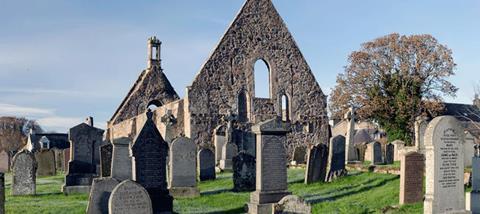
Almost half of adults in Scotland do not identify with any religion, according to official figures. Some Christians are discouraged by this news and some of the more militant atheistic secularists can hardly contain their glee.
The latest Scottish Household Survey (SHS), had 47% of people describing their ‘faith’ as none’. The proportion has increased from 40% in 2009.
27.8% identified themselves as Church of Scotland, 14.5% as Roman Catholic, 1.4% as Muslim, other Christian as 7.7%, Buddhist (0.3%), Sikh (0.1%), Jewish (0.1%), Hindu (0.3%), Pagan (0.1%), and other religion (0.5%).
There has also been a corresponding decrease in the proportion describing themselves as 'Church of Scotland', from 34% to 28%.
One always has to be careful about figures. The sample size (1,000 households) is not massive.
For every 1,000 people there is only one pagan, one Jew, 14 Muslims and 470 ‘no faith’ (incidentally this latter description is false – most of this group will have great faith – just not faith in God or gods!).
Is Scotland progressing into an atheistic secularist nirvana, or regressing into a pagan mess?
So what does this all mean? Is the church on the way out? Is Scotland progressing into an atheistic secularist nirvana, or regressing into a pagan mess?
Although the majority of people in Scotland (just) would still claim some kind of Christian faith, the fact is that the number of those attending church and engaging in any kind of Christian practice is declining.
Crisis in the Church?
The Church reached a numerical peak in the 1950s and it has been downhill ever since. Rather than that decline bottoming out (as for example in London), in Scotland it seems to be accelerating. The Church of Scotland has dropped below 400,000 members (it is doubtful whether more than 100,000 actually attend church each Sunday – meaning that less than 1% of Scotland’s population are actually in the Church of Scotland on any given Sunday) and is continuing to lose 20,000 members each year.
The Church is also facing a major financial crisis and above all a ministerial one, with only a handful of the required 30-40 ministers being trained each year. The picture is of a declining church in a declining culture. The Catholic Church is still struggling to recover from the child abuse scandals, and there is little evidence that other Protestant churches are making much of an impact.
As a result of the new moralistic philosophy of secular humanism being adopted by the metro-elites and governors of our culture, and the lack of a coherent and strong ‘salt and light’ Christian church, our culture has become increasingly confused.
There has been a general dumbing down. Things that would have been unthinkable a decade ago (such as same sex ‘marriage’) have now become the norm of the new morality.
Things that are unthinkable just now; infanticide, involuntary euthanasia, polygamy, paedophilia could easily become the new ‘norm/human right’ in a world where the rich and powerful determine what the moral values are. We are a society that has ‘equality’ as its mantra, but yet we are becoming more unequal.
In one of the richest societies in the world we have tens of thousands who are relying on food banks. Our politicians say they want to support ‘the family’ but are unable to define what that actually is, and as a result many of their actions end up undermining the family. That is the environment which the Church in Scotland finds itself.
Encouraging news
Although overall the Church in Scotland is in decline, it is not all bad news. I see three areas where there is encouragement and renewal.
Firstly in the independent evangelical churches associated with FIEC – e.g. Charlotte Chapel in Edinburgh and the work of Twenty Schemes in Niddrie and elsewhere are beacons of light.
Secondly there are other biblical churches who have Christ and his Word at the centre of their lives and message who are seeing growth and development – some will be in the Church of Scotland, others associated with CLAN or other charismatic and ex-Brethren networks and some in the Baptist and Anglican churches. And how can anyone who believes in a Sovereign God exclude the possibility of him yet working in and through the Catholic Church?
We are also seeing the first signs of a renewed and reinvigorated Presbyterianism in Scotland in my own denomination, the Free Church. New churches are being planted, people are being converted and membership is increasing. The Free Church College has been relaunched as Edinburgh Theological Seminary, and there is a new leadership rising.
In a hostile and increasingly militant secularist environment, traditional, liberal, nominal Christianity cannot survive
I came to my current church (St Peters in Dundee) in 1992 when the attendance was in single figures. Now there are over 250 (many of them young people), we have planted a new church in St Andrews and are planning a couple more.
In a hostile and increasingly militant secularist environment, traditional, liberal, nominal Christianity cannot survive. But those churches that have deep roots in the gospel will I believe see growth and renewal.
So we have a paradox. We have an increasingly atheistic secularist culture, marked by a rapid decline in Churchianity, along with an increasingly alive and growing biblical Christianity. It is the latter that turned the Roman empire upside down and indeed turned Scotland upside down before. All we can pray is ‘Lord, do it again’!


























